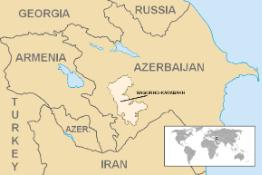Turkish President Abdullah Gul met with Turkmenistan President Gurbanguli Berdymukhamedov yesterday, and while both leaders expressed their “. . .mutual will for improving bilateral economic and commercial relations between the two countries,” no agreement was announced on whether or not Turkmeni gas will feed the proposed Nabucco pipeline that would make Turkey a gas hub connecting Central Asia with Southern and Central Europe. For Today’s Zaman (Turkey), that meant the two countries “agree to boost economic cooperation.” For RIA Novosti, citing a Turkish-language paper, that meant “Nabucco trans-Caspian gas pipeline in jeopardy.” WPR contributing editor John Rosenthal recently wrote about […]
Central Asia Archive
Free Newsletter

Last month, a remarkable transformation occurred in the controversial Nabucco gas pipeline project — or at any rate in the public perception of the project in the English-speaking world. As recently as last fall, in fact, there was barely any public perception of the Nabucco project in the English-speaking world because there was barely any coverage of the project in the English language media. (For a rare exception, see “Iran-Turkey Gas Deal Gives New Hope for EU Nabucco Pipeline” on World Politics Review.) In the central European press, on the other hand, the project was widely heralded as a crucial […]
It looks like the Nabucco gas pipeline project just took another hit. Russia just announced an agreement with the ‘Stans (Khazak-, Turkmeni-, and Uzbeki-) raising its purchase price of their gas to European market rates, thereby appropriating one of the major attractions of the U.S.-EU offer. As this analysis points out, though, the deal is something of a trade-off for Russia, since it complicates their South Stream pipeline project by reducing marginal profits that pipeline would have offered its southern European partners. That, more than the dissolution of the Serbian parliament, might be what motivated remarks by Serbia’s parliamentary speaker […]

On March 4, Azerbaijan’s breakaway enclave of Nagorno-Karabakh became a scene of one of the most controversial attacks there since a May 1994 ceasefire, which established a no war, no peace situation in the region. The conflict started in 1988, when the predominantly Armenian population of Nagorno-Karabakh stated its intention to secede from Azerbaijan. The resulting war caused severe casualties and massive population displacement on both sides. Azerbaijan lost control over the majority of Nagorno-Karabakh’s territory and the adjacent seven regions. Although the Nagorno-Karabakh republic currently enjoys de-facto independence, no country has recognized it as an independent entity. Despite decade-long […]
